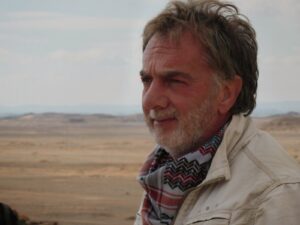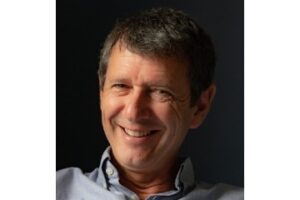Desert Insurgency: Archaeology, T.E. Lawrence, and the Arab Revolt
For 10 years, between 2005 and 2014, the ‘Great Arab Revolt Project’ (GARP) investigated the remains of the 1916-1918 Arab Revolt in southern Jordan, from Ma’an to Mudawwara.
Expecting initially to survey and excavate the mainly ruinous Hejaz Railway stations for perhaps three years, events soon changed this to a 10-year project. The stations were investigated, but it was the unexpected discovery of conflict landscapes in-between the stations and farther out in the desert that required more investigation and was added to by the discovery of over 100 pre-Revolt construction-era camps built by and for the labour gangs who constructed the railway. Discoveries included defensive earthwork ‘karakolls’, stone-built forts, machine-gun positions, Ottoman army campsites, overnight raiding camps for Rolls Royce armoured cars, and even ephemeral Royal Air Force landing grounds.
GARP research fleshed out the Revolt in this region, uncovered unsuspected landscapes, and added a new dimension to Jordanian heritage.
Register for this event here.
About the speaker:
 Nicholas J Saunders is Emeritus Professor of Material Culture in the Department of Anthropology and Archaeology at Bristol University. His research focuses on the material
Nicholas J Saunders is Emeritus Professor of Material Culture in the Department of Anthropology and Archaeology at Bristol University. His research focuses on the material
culture, landscapes and cultural memories of twentieth and twenty-first century conflict in Europe and the Middle East. Fieldwork in France, Belgium, Bosnia, Slovenia and Jordan is supplemented by ongoing research into the material culture of the Chinese Labour Corps on the Western Front.
Between 2006 and 2014 he was co-director of the Great Arab Revolt
Project (GARP) in southern Jordan – investigating the 1916-1918 Arab Revolt along the Hejaz Railway from Ma’an to Mudawwara – in co-operation with Al Hussein bin Talal University.
His publications include: Trench Art: Materialities and Memories of War (2003), Modern Conflict and the Senses (2017), Desert Insurgency: T.E. Lawrence, Archaeology and the Arab Revolt (2020), and Conflict Landscapes (2021). He is co-editor of the Routledge series ‘Material Culture and Modern Conflict’.
About the discussant:
Bakr Khazer Almajali is a distinguished Jordanian historian. Originally born in Al-Qasr in the Al Karak governorate, he is a graduate of the Royal Military College at Mutah University. He continued his service in the Jordanian Army in prominent roles until 1996, including as Director of the Martyrs’ Memorial and the Jordanian Military Museum. He has subsequently worked as a university researcher, consultant and advisor at the Royal Hashemite Court, including on projects to renovate the Historical Museum in Ma’an (‘The Founder’ King Abdullah I Palace) and the Martyr’s Memorial. He holds a PhD from the University of New Hampshire (USA) for his thesis The Renaissance and Independence Movements in the Arab Mashreq from 1850 AD to 1925 AD. He has published extensively on Islamic and Jordanian history, the Hashemite Royal Family, the Jordanian Arab Army, and the Great Arab Revolt. He has won many prizes and recognition for his scholarly work and achievements, notably for his documentary scripts for radio and television.
About the chair:
 Robert Bewley is Chair of CBRL’s Board. He is the Co-founder and former Director of the Endangered Archaeology in the Middle East and North Africa project (from 2015-2020) at the University of Oxford. He is the Director of the Aerial Archaeology in Jordan project and in 2018 was able to set up the Aerial Archaeology in Oman project. Bob received his PhD in Archaeology from the University of Cambridge and was an undergraduate at Manchester University studying Ancient History and Archaeology. He is the author of six books, including Prehistoric Settlements (1994 and 2003), Aerial Archaeology – Developing Future Practice (2002 with W. Raçzkowski) and Ancient Jordan from the Air (2004 with David Kennedy).
Robert Bewley is Chair of CBRL’s Board. He is the Co-founder and former Director of the Endangered Archaeology in the Middle East and North Africa project (from 2015-2020) at the University of Oxford. He is the Director of the Aerial Archaeology in Jordan project and in 2018 was able to set up the Aerial Archaeology in Oman project. Bob received his PhD in Archaeology from the University of Cambridge and was an undergraduate at Manchester University studying Ancient History and Archaeology. He is the author of six books, including Prehistoric Settlements (1994 and 2003), Aerial Archaeology – Developing Future Practice (2002 with W. Raçzkowski) and Ancient Jordan from the Air (2004 with David Kennedy).












